2009年协会货物条款(A)、(B)、(C)
2009协会货物保险条款

2009年伦敦协会货运险条款较1982年版的变化王莹(太平保险上海分公司)上海保险2009.7最近,在国际贸易中普遍采用的英国伦敦保险协会所制定的《协会货物运输保险条款》(即ICC保险条款)作出了值得关注的修改,联合货物保险委员会(Joint Cargo Committee)推出了2009年1月1日版本的新条款。
新条款扩展了保险责任起讫期,对保险公司引用免责条款作出了一些条件限制,对条款中容易产生争议的用词作出更为明确的规定,条款中的文字结构也更为简洁、严密。
为便于读者了解2009年1月1日版本的《协会货物运输保险条款》与1982年1月1日版本的变化,笔者下面仅以《协会货物运输保险条款(A)》(即ICC(A))为例,采用列表形式对2009年和1982年两个版本作一些比较:一、普遍性的改变1、82版除外条款下分别列有副标题,如除外条款4:普通除外条款;除外条款5:不适航或不适运除外条款;除外条款6:战争除外条款;除外条款7:罢工除外条款。
09版除外条款删除副标题,直接表示为:除外条款4,除外条款5,除外条款6,除外条款7。
因为副标题并不能完全准确地表述出副标题下所有具体列明的事项,如除外条款6若名为“战争除外条款”,但实际条款内容中列明“扣押、扣留、拘禁或羁押”,是否能理解是因战争原因导致的“扣押、扣留、拘禁或羁押”才除外呢;又如除外条款7若名为“罢工除外条款”,但实际条款内容中列明“任何恐怖主义者或者任何人出于政治目的采取的行动”也为除外,显然与所谓“罢工除外”不相一致。
为了避免歧义产生误解,09版除外条款则不再注明副标题。
2、09版将所用“雇员”一词变为“employee”,代替了82版的“servant”。
3、09版使用“保险标的”(subject matter insured),而非82版的“货物”(goods or cargo)。
4、09版使用“保险人”(insurers),不再使用82版的“承保人”(underwriters)。
协会货运保险条款(A)2009版
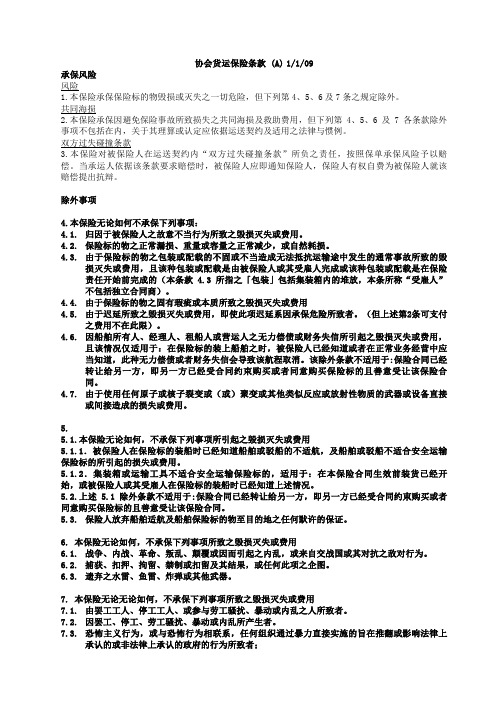
协会货运保险条款 (A)1/1/09承保风险风险1.本保险承保保险标的物毁损或灭失之一切危险,但下列第4、5、6及7条之规定除外。
共同海损2.本保险承保因避免保险事故所致损失之共同海损及救助费用,但下列第4、5、6及7各条款除外事项不包括在内,关于其理算或认定应依据运送契约及适用之法律与惯例。
双方过失碰撞条款3.本保险对被保险人在运送契约内“双方过失碰撞条款”所负之责任,按照保单承保风险予以赔偿。
当承运人依据该条款要求赔偿时,被保险人应即通知保险人,保险人有权自费为被保险人就该赔偿提出抗辩。
除外事项4.本保险无论如何不承保下列事项:4.1. 归因于被保险人之故意不当行为所致之毁损灭失或费用。
4.2. 保险标的物之正常漏损、重量或容量之正常减少,或自然耗损。
4.3. 由于保险标的物之包装或配载的不固或不当造成无法抵抗运输途中发生的通常事故所致的毁损灭失或费用,且该种包装或配载是由被保险人或其受雇人完成或该种包装或配载是在保险责任开始前完成的(本条款 4.3所指之「包装」包括集装箱内的堆放,本条所称“受雇人”不包括独立合同商)。
4.4.由于保险标的物之固有瑕疵或本质所致之毁损灭失或费用4.5.由于迟延所致之毁损灭失或费用,即使此项迟延系因承保危险所致者。
(但上述第2条可支付之费用不在此限)。
4.6.因船舶所有人、经理人、租船人或营运人之无力偿债或财务失信所引起之毁损灭失或费用,且该情况仅适用于:在保险标的装上船舶之时,被保险人已经知道或者在正常业务经营中应当知道,此种无力偿债或者财务失信会导致该航程取消。
该除外条款不适用于:保险合同已经转让给另一方,即另一方已经受合同约束购买或者同意购买保险标的且善意受让该保险合同。
4.7.由于使用任何原子或核子裂变或(或)聚变或其他类似反应或放射性物质的武器或设备直接或间接造成的损失或费用。
5.5.1.本保险无论如何,不承保下列事项所引起之毁损灭失或费用5.1.1.被保险人在保险标的装船时已经知道船舶或驳船的不适航,及船舶或驳船不适合安全运输保险标的所引起的损失或费用。
协会货物条款(A)

18.协会水险保单统一条款(货物)以下统一条款为本保单合约内容的一部分法律及惯例条款本保险以英国法律及惯例为依据。
保险利益条款1.被保险人在损害发生时,须对被保险标的物具有保险利益,始能要求本保险之赔偿。
2.依上述1之约定,被保险人对保险期间内所发生之被保物之损失,有权利要求赔偿,即使损失发生于保险契约签订之前亦同,但被保险人知道损害已经发生而保险人不知者,则不在此限。
被保险人义务条款被保险人及其受雇人及代理人对本保险之可赔损失,应尽下列义务。
1.应采取避免或减轻上述损失之适当措施及2.一切对抗运送人、受托人或其他第三者之权利应予适当保留及行使。
保险人同意除本保险可得之任何损失赔偿外,对于被保险人为履行上述义务所作适当,合理支出之一切费用另予补偿。
放弃条款被保险人或保险人为救助、保护或回复保险标的所采取之措施,不得视为对委付之放弃或接受放弃,或影响任何一方当事人之权益。
战争除外条款本保险无论如何,不承保下列事项所致之毁损灭失或费用1.战争、内战、革命、叛乱、颠覆或因而引起之内乱,或来自交战国或其对抗之敌对行为。
2.捕获、扣押、拘留、禁制或扣留及其结果,或任何此项之企图。
3.遗弃之水雷、鱼雷、炸弹或其他武器。
核辐射、污染除外条款在任何情况下均不承保因使用核子分裂或融合或其他类似反应或放射能、放射性物质之战争性武器所引起的毁损灭失或费用。
以下条款为至高条款,此条款高于一切其他在本保单合约内容里出现过的条款如本保单延伸承保了任何因以上战争除外条款里免除了的风险造成的损失或费用,对此项战争风险的承保不延伸承保任何因航程被破坏或被取消而带来的理赔。
英国伦敦保险协会ABC条款
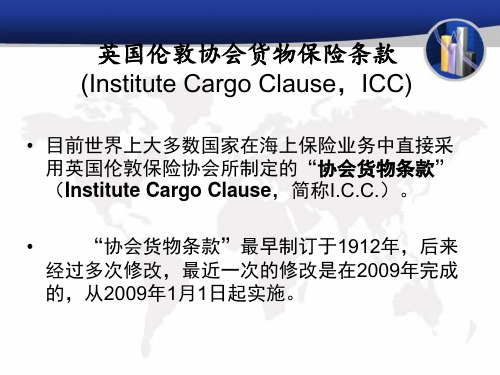
CASE
• 我方按CIF出口冷冻食品一批,合同规定投保平安险加战 争、罢工一险。货到目的港后适逢码头工人罢工,港口无 人作业,货物无法卸载。不久货轮因无法补充燃料以致冷 冻设备停机。等到罢工结束,该批冷冻食品已变质。
• 请问这种由于罢工而引起的损失,保险公司是否负责赔偿? • 分析:保险公司只对因罢工造成的直接损失负责赔偿。对
Cargo); • (6)恶意损害险条款(Malicious Damage Clauses)
协会海运货物保险条款的承保风险
一、ICC(A)承保风险与除外责任 ICC(A)的责任范围最广,大体相当于中国人民
保险公司所规定的一切险。协会货物条款采用承 保“除外责任”之外的一切风险的概括式规定办 法,即对于“除外责任”项下所列风险保险人不 予负责外,其他风险均予负责。
运输工具 11、货物在装卸时落海或跌落造成整件
的全损
• ICC(B)险的除外责任方面:除对“海盗行为” 和恶意损害险的责任不负责外,其余均与(A)
险的除外责任相同。
三、ICC(C)承保风险与除外责任
• ICC(C)承保“重大意外事故”,而不承保自然 灾害及非重大意外事故。主要包括: 1、火灾、爆炸 2、船舶或驳船触礁、搁浅、沉没或倾覆 3、陆上运输工具倾覆或出轨 4、船舶、驳船或运输工具与水以外的任何 外界物体碰撞 5、在避难港卸货 6、共同海损牺牲 7、抛货
ICC(B)]; • (3)协会货物条款(C) [Institute Cargo Clauses (C),
ICC(C)]; • (4)协会战争险条款(货物)(Institute War Clauses—Cargo); • (5)协会罢工险条款(货物)(Institute Strikes Clauses-
协会货运保险条款(A)2009版

协会货运保险条款 (A)1/1/09承保风险风险1.本保险承保保险标的物毁损或灭失之一切危险,但下列第4、5、6及7条之规定除外。
共同海损2.本保险承保因避免保险事故所致损失之共同海损及救助费用,但下列第4、5、6及7各条款除外事项不包括在内,关于其理算或认定应依据运送契约及适用之法律与惯例。
双方过失碰撞条款3.本保险对被保险人在运送契约内“双方过失碰撞条款”所负之责任,按照保单承保风险予以赔偿。
当承运人依据该条款要求赔偿时,被保险人应即通知保险人,保险人有权自费为被保险人就该赔偿提出抗辩。
除外事项4.本保险无论如何不承保下列事项:4.1. 归因于被保险人之故意不当行为所致之毁损灭失或费用。
4.2. 保险标的物之正常漏损、重量或容量之正常减少,或自然耗损。
4.3. 由于保险标的物之包装或配载的不固或不当造成无法抵抗运输途中发生的通常事故所致的毁损灭失或费用,且该种包装或配载是由被保险人或其受雇人完成或该种包装或配载是在保险责任开始前完成的(本条款 4.3所指之「包装」包括集装箱内的堆放,本条所称“受雇人”不包括独立合同商)。
4.4.由于保险标的物之固有瑕疵或本质所致之毁损灭失或费用4.5.由于迟延所致之毁损灭失或费用,即使此项迟延系因承保危险所致者。
(但上述第2条可支付之费用不在此限)。
4.6.因船舶所有人、经理人、租船人或营运人之无力偿债或财务失信所引起之毁损灭失或费用,且该情况仅适用于:在保险标的装上船舶之时,被保险人已经知道或者在正常业务经营中应当知道,此种无力偿债或者财务失信会导致该航程取消。
该除外条款不适用于:保险合同已经转让给另一方,即另一方已经受合同约束购买或者同意购买保险标的且善意受让该保险合同。
4.7.由于使用任何原子或核子裂变或(或)聚变或其他类似反应或放射性物质的武器或设备直接或间接造成的损失或费用。
5.5.1.本保险无论如何,不承保下列事项所引起之毁损灭失或费用5.1.1.被保险人在保险标的装船时已经知道船舶或驳船的不适航,及船舶或驳船不适合安全运输保险标的所引起的损失或费用。
协会货运保险条款2009版与1982版的比较分析
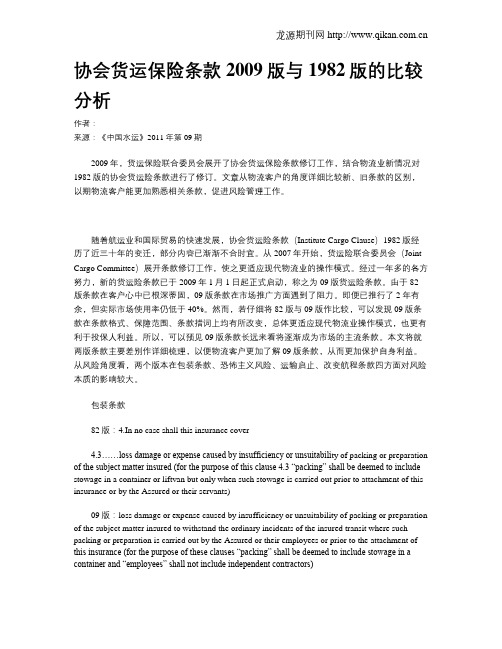
协会货运保险条款2009版与1982版的比较分析作者:来源:《中国水运》2011年第09期2009年,货运保险联合委员会展开了协会货运保险条款修订工作,结合物流业新情况对1982版的协会货运险条款进行了修订。
文章从物流客户的角度详细比较新、旧条款的区别,以期物流客户能更加熟悉相关条款,促进风险管理工作。
随着航运业和国际贸易的快速发展,协会货运险条款(Institute Cargo Clause)1982版经历了近三十年的变迁,部分内容已渐渐不合时宜。
从2007年开始,货运险联合委员会(Joint Cargo Committee)展开条款修订工作,使之更适应现代物流业的操作模式。
经过一年多的各方努力,新的货运险条款已于2009年1月1日起正式启动,称之为09版货运险条款。
由于82版条款在客户心中已根深蒂固,09版条款在市场推广方面遇到了阻力。
即便已推行了2年有余,但实际市场使用率仍低于40%。
然而,若仔细将82版与09版作比较,可以发现09版条款在条款格式、保障范围、条款措词上均有所改变,总体更适应现代物流业操作模式,也更有利于投保人利益。
所以,可以预见09版条款长远来看将逐渐成为市场的主流条款。
本文将就两版条款主要差别作详细梳理,以便物流客户更加了解09版条款,从而更加保护自身利益。
从风险角度看,两个版本在包装条款、恐怖主义风险、运输启止、改变航程条款四方面对风险本质的影响较大。
包装条款82版:4.In no case shall this insurance cover4.3……loss damage or expense caused by insufficiency or unsuitabili ty of packing or preparation of the subject matter insured (for the purpose of this clause 4.3 “packing” shall be deemed to include stowage in a container or liftvan but only when such stowage is carried out prior to attachment of this insurance or by the Assured or their servants)09版:loss damage or expense caused by insufficiency or unsuitability of packing or preparation of the subject matter insured to withstand the ordinary incidents of the insured transit where such packing or preparation is carried out by the Assured or their employees or prior to the attachment of this insurance (for the purpose of these clauses “packing” shall be deemed to include stowage in a container and “employees” shall not include independent contractors)从82版条款内容看,原针对包装不当的除外条款,即使是在被保险人控制之外以及在保险起期后意外受损的风险均被除外,这显然对被保险人是不恰当的。
2009年协会货物条款

2009年协会货物条款(A)、(B)、(C)Institute Cargo Clauses (A) (1/1/09) / Institute Cargo Clauses (B) (1/1/09) / Institute Cargo Clauses (C) (1/1/09)在时间上本书的出版(第一版与第二版)也十分适合,因为除了重点介绍有关船舶保险的2003年国际船舶保险条款外,海上货物保险也有了新的条款刚刚在2009年1月1日拟定并在2月份推出。
虽然相比1982年的协会货物条款改变不多,但可以去把几个主要的实质性改变在本书本章中略为介绍。
事实上,更重要的改变是早在1982年的协会货物条款已经有,这已经在本书第一版有所介绍。
这就是从几百年来英国一直援用的劳合社S.G.保单,一下变了去使用1982年的协会货物条款(A)、(B)与(C)。
这一个主要的改变可以说是海上保险的革命,主要的推动是来自联合国1975年的报告对S.G保单与海上保险作出严厉批评与其他一连串的建议,例如要以联合国的保险条款替代伦敦的保险条款等,所带来。
而伦敦以前一直以来坚持要保持S.G保单的做法是为了防止新的条款会带来不稳定,会带来很多的诉讼,要去对有关新的条款作出权威性的解释,等。
而S.G保单由于历史的原因,可以说它上面差不多每一个字都有先例给与了权威性的解释。
不论历史是怎样,事实上在有了1982年的协会货物条款后,并被国际上大量使用,但现实上所带来的诉讼是寥寥可数,可见伦敦保险市场较早时的忧虑根本是多余。
也可以印证了保险条款的改变是不需要害怕的,只要是改变了的条款是有一班高水平的人士去拟定得好、清楚明了与全面。
而现在到了20年以后,有了新的条款,但这再也谈不上是革命,而只是应酬式地作出一点点地改变而已,甚至是两条款的各条款编号都是一样的。
而各条款是可以分为8大类去作出不同的针对,其中第1-3条款归类为“承保风险”(risks covered);第4-7条款归类为“除外/豁免条款”(exclusions);第8-10条款归类为“承保期限”(duration);第11-14条款归类为“索赔”(claims);第15条款归类为“保险利益”(benefit of insurance);第16-17条款归类为“减少损失或施救责任”(minimising losses);第18条款归类为“避免延误”(avoidance of delay);第19条款归类为“适用法”(law and practice)。
协会货物条款中海上货物运输保险期间的开始

协会货物条款中海上货物运输保险期间的开始摘要:从海上货物运输保险的理赔实务来看,保险责任期间是关乎保险人和被保险人利益的重要问题。
伦敦保险业协会在2009 年2 月份推出了协会货物条款的新版本,其中第8.1 条运输条款在对保险责任期间的规定上与之前版本有显著区别。
笔者试对该条款中有关海上货物保险期间的开始进行界定和分析。
关键词:海上货物运输保险;保险期间的开始;运输条款;首次移动;立即装上;开始运输海上货物运输保险是为海上运输和海上贸易提供风险保障的险种。
保险期间是指当保险事故发生时,保险人因保险标的发生损失负担给付保险金责任的时间的起点和终点,即海上货物运输保同效力开始与终止的期间。
1、协会货物条款发展历史概述英国伦敦协会货物条款( Institute Cargo Clause A/B/C ,简称ICC),最早制定于1912年,是在劳合社S.G保险单的基础上,不断增添有关附加或限制某些保险责任的条文,经过整理而形成的一套伦敦协会货物保险条款。
为了适应日益发展的国际贸易对保险的需要,伦敦保险业协会对其进行了修改。
新的保险单格式即1982年协会货物条款代替原来的S.G保险单格式,自1983年4月1日起使用。
新的保险单格式条款更为清楚明了、全面、高水平,对保险单的规范起到了重要作用。
但经过20 多年国际贸易、航运、法律等方面新的变化和发展,该格式中的有些条款已不再符合现实的需要。
伦敦保险业协会在2009 年2 月份推出了协会货物条款的新版本。
这一版本中的第8.1 条运输条款在对保险责任期间开始的规定上就与82 版本存在很大区别。
2、2009 年协会货物条款第8.1 条ICC2009 第8.1 条(Transit Clause)是这样规定的:"Subject to Clause 11 below,this insurance attaches from the time the subject-matter insured is first moved in the warehouse or at the place of storage (at the place named in the contract of insurance) for the purpose of theimmediate loading into or onto the carrying vehicle or other conveyance for the commencement of transit,该条实际上是新的"Transit Clause"。
协会货物保险A条款(doc 8页)

4. 本保险在任何情形下,均不承担:4.1 因被保险人的故意违法行为所导致的灭失、损害或费用。
4.2 保险标的的正常渗漏、重量或体积的正常减少或自然损耗。
4.3 保险标的的包装或准备不足或不当引起的灭失、损害或费用(在本款意义上,“包装”应视为包括集装箱或托盘内的积载,但仅适用于此种积载是在本保险责任开始前进行或是由被保险人或其雇员进行之时)。
4.4 保险标的的固有缺陷或性质引起的灭失、损害或费用。
4.5 迟延造成的灭失、损害或费用,即使该迟延是由承保风险引起的(但根据上述第2条支付的费用除外)。
4.6 因船舶的所有人、经理人、承租人或经营人的破产或经济困境产生的灭失、损害或费用。
4.7 因使用原子或核裂变和/或聚变或其他类似反应或放射性力量或物质所制造的战争武器产生的灭失、损害或费用。
5(不适航或不适运除外条款)5.1 本保险决不承保因下列事项所产生的灭失、损害或费用:5.1.1 船舶或驳船不适航5.1.2 船舶、驳船、运输工具、集装箱或托盘对保险标的的安全运输不适合,而且在保险标的装于其上时,被保险人或其雇员是对此种不适航或不适运有私谋。
5.2 保险人放弃载运保险标的到目的港的船舶不得违反默示适航或适运保证,除非被保险人或其雇员对此种不适航或不适运有私谋。
(战争除外条款)6、本保险决不承保因下列事项所产生的灭失、损害或费用:6.1 战争、内战、革命、造反、叛乱、或由此引起的内乱或任何交战方之间的敌对行为。
6.2 捕获、扣押、扣留、拘禁或羁押(海盗除外)和此种行为引起的后果或进行此种行为的企图。
6.3 被遗弃的水雷、鱼雷、炸弹或其他被遗弃的战争武器。
(罢工除外条款)7. 本保险在任何情形下,均不承保下列灭失、损害或费用:7.1 罢工工人、停工工人或参加工潮、暴动或民变的人员造成的7.2 罢工、停工、工潮、暴动或民变造成的7.3 恐怖分子或出于政治动机而行为的人员造成的保险期间(运输条款)88.1 本保险责任自货物因运输而从本保单所载明的仓库或储存处所起运时开始,在正常运输过程中连续有效,终止于:8.1.1 在载明的目的地交付到收货人的或其他最后仓库或储存处所8.1.2 在载明的目的地或之前交付到任何其他仓库或储存处所,其由被保险人用作:8.1.2.1 正常运输过程以外的储存,或8.1.2.2 分配或分派;或者8.1.3 在最终卸货港,被保险货物自全部卸离海船时起满60天以上各项以先发生者为准。
09年货代真题答案解析

09年真题答案解析3.D【解析】ABC三项都属于国际货运代理责任保险的除外责任,对于由此情况造成的损失,保险公司不负赔偿责任。
4。
C【解析」1)项发盘可以是应对方询盘的要求发出,也可以是在没有询盘的情况下,直接向对方发出。
5答案】A【解析】信用证方式是一种纯粹的单据业务,各当事人处理的是单据,而不是有关的货物、服务或履约行为。
根据银行惯例,采用信用证支付方式时,银行不需亲自询问单据是否是假的、己装运的货物是否是假的、已装运的货物是否真正装运以及单据签发后是否失效。
6 [答案]D【解析】共同海损是指当船、货及其他利益方处于共同危险时,为了共同的安全而由船长人为地采取合理的措施所引起的特殊牺牲和额外的费用,这种损失由受益各方按其财产价值进行分摊。
ABC三项都不属于共同海损。
7 [答案]C【解析」AD项FOB和FCA术语后面必须跟出「I国港日,不能是国家或进门国港Cl ; B项MY术语后面必须跟进口囚港口,不能是国家或出口国港口。
8 [答案]BI解析】采用信用证支付方式时,开证行负首要付款责任。
在信用证交易中,银行根据信用证取代买方承扣了作为第一付款人的义务。
只要卖方提供了符合信用证的单据,即使买方破产,卖方也能从银行得到付款保证。
9 [答案]D【解析】在实际业务中,买卖双方出于不同的考虑,对于装卸费用问题作出不同的规定,于是就形成了贸易术语的不同变形。
通常,贸易术语的变形只是为了说明程租船条件下,装卸船费用山谁承担的问题,而不改变交货地点、风险转移界限、支付条件以及运输方式。
CIF贸易术语的变形是为了明确货物在卸货港的卸货费由买卖双方谁来承担。
10 C【解析】A项适用最惠国税率的进口货物有暂定税率的,应当适用暂定税率;b项适用协定税率、特惠税率的进日货物有暂定税率的,应当从低适用税率;d项适用普通税率的进口货物,不适用暂定税率。
11【答案】BI解析】出境货物的检验检疫工作程序是:报检后先检验检疫,再放行通关。
我国海上货物运输保险附加险条款
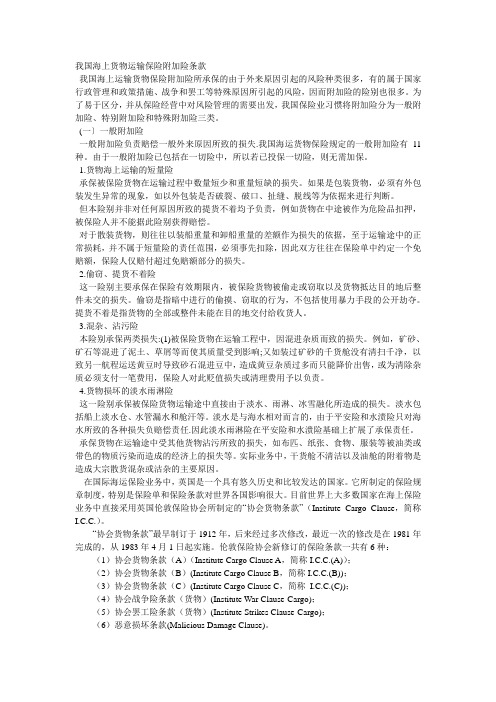
我国海上货物运输保险附加险条款我国海上运输货物保险附加险所承保的由于外来原因引起的风险种类很多,有的属于国家行政管理和政策措施、战争和罢工等特殊原因所引起的风险,因而附加险的险别也很多。
为了易于区分,并从保险经营中对风险管理的需要出发,我国保险业习惯将附加险分为一般附加险、特别附加险和特殊附加险三类。
(一〕一般附加险一般附加险负责赔偿一般外来原因所致的损失.我国海运货物保险规定的一般附加险有11种。
由于一般附加险已包括在一切险中,所以若已投保一切险,则无需加保。
1.货物海上运输的短量险承保被保险货物在运输过程中数量短少和重量短缺的损失。
如果是包装货物,必须有外包装发生异常的现象,如以外包装是否破裂、破口、扯缝、脱线等为依据来进行判断。
但本险别并非对任何原因所致的提货不着均予负责,例如货物在中途被作为危险品扣押,被保险人并不能据此险别获得赔偿。
对于散装货物,则往往以装船重量和卸船重量的差额作为损失的依据,至于运输途中的正常损耗,并不属于短量险的责任范围,必须事先扣除,因此双方往往在保险单中约定一个免赔额,保险人仅赔付超过免赔额部分的损失。
2.偷窃、提货不着险这一险别主要承保在保险有效期限内,被保险货物被偷走或窃取以及货物抵达目的地后整件未交的损失。
偷窃是指暗中进行的偷摸、窃取的行为,不包括使用暴力手段的公开劫夺。
提货不着是指货物的全部或整件未能在目的地交付给收货人。
3.混杂、沾污险本险别承保两类损失:(1)被保险货物在运输工程中,因混进杂质而致的损失。
例如,矿砂、矿石等混进了泥土、草屑等而使其质量受到影响;又如装过矿砂的千货舱没有清扫千净,以致另一航程运送黄豆时导致砂石混进豆中,造成黄豆杂质过多而只能降价出售,或为清除杂质必须支付一笔费用,保险人对此贬值损失或清理费用予以负责。
4.货物损坏的淡水雨淋险这一险别承保被保险货物运输途中直接由于淡水、雨淋、冰雪融化所造成的损失。
淡水包括船上淡水仓、水管漏水和舱汗等。
最新国家开放大学电大《国际经济法》案例分析题库及答案

最新国家开放大学电大《国际经济法》案例分析题库及答案1. 2009年,中国A公司与新加坡B公司签订了合同,B公司向A公司出口1000袋面粉,价格条件为CFR,每袋单价为50美元。
A公司在中国人民保险公司投保了水渍险。
该批货物由巴西籍某轮承运。
在新加坡港装货的过程中,船长先后向托运人发出书面声明,指出货物堆放于码头无任何遮盖物并发生雨水的污染,宣布货物为不清洁。
托运人为了结汇则出据了保函,承运人签发了清洁提单。
货轮抵达了中国港口,经外轮理货公司理货,发现180袋有雨水污染,并确认货物短少40袋。
试问:(1)收货人可否向承运人索赔?为什么?(2)承运人可否依保函要求收货人向托运人索赔?为什么?(3)保险公司应否赔付180袋因雨水污染造成的面粉损失?为什么?答:(1)可以。
因为承运人签发了清洁提单,即有义务按照清洁提单的要求交付外表状况良好的货物。
(2)不可以。
依据《汉堡规则》的规定,保函不可以对抗第三人。
(3)不可以。
本题投保的是水渍险,水渍险不包括雨水造成的损失。
2. 2006年3月10日,欧盟B公司与中国A粮油公司签订了从中国进口10000吨大豆的合同,价格条件为FOB(天津新港),每吨单价为450美元。
2006年7月26日,该批货物在天津新港装船完毕,由C公司所属的“奥巴马”号货船将货物从天津新港运至阿姆斯特丹港。
货物已投保伦敦保险业协会货物保险A条款(相当于中国人民保险公司的海洋货物运输一切险)。
“奥巴马”号按时到达阿姆斯特丹港。
由于码头工人罢工,船上大豆不能卸货达1个月之久,致使船上所载大豆变质。
收货人向D保险公司提出索赔。
D保险公司拒赔。
试问:(1)该合同应由哪一方当事人订立运输合同和保险合同?为什么?(2)货物风险何时转移?(3)如果提单受《海牙规则》调整,收货人是否可以向承运人索赔?为什么?(4)根据平安险,D保险公司应否赔付收货人的损失?答:(1)应该由买方欧洲B公司订立运输合同和保险合同。
协会货物保险基本条款

(参见教科书)
9
第三节 协会海运货物保险条款的除外责任
一、ICC2009(A)、(B)和(C)除外责任概述 现将2009年伦敦保险协会海运货物保险条款 的除外责任以表16.3予以概述。 表16.3 ICC2009(A)、(B)和(C)除外责任 (参见教科书)
10
二、ICC2009(A)、(B)和(C)除外责任的划分
(一)ICC2009(A)的承保风险 如前所述,ICC2009(A)对其承保风险的规定 采取“一切风险减除外责任”的方式,并未列举 具体承保风险的名称。因此,只须弄清楚它的 “除外责任”,便不难理解其所承保的风险及其 含义。
7
(二)ICC2009(B)和(C)的承保风险
ICC2009(B)和(C)对承保风险的规定采取 “列明风险”的方式。这种方式对被保险人来说, 承保风险十分明确、肯定,便于被保险人(或 投保人)选择适当的险别;对保险人来说有利 于处理保险索赔。但这些承保风险,按其适用 原则的不同,又可分为两大类:
19
一、协会海运货物战争险条款 (一)承保风险 (二)除外责任 二、协会海运货物罢工险条款 (一)承保风险 (二)除外责任
20
第五节 协会货物附加险 除了前述的可独立投保的险别外,英国 保险协会还增加了“恶意损害险”、“偷窃、 提货不着险”等附加险。由于它们没有完整的 结构,不能独立投保,是由保险双方在基本险 基础上加保。
2
2005年,英国又对ICC1982予以修订,并于2009年公布了 最新版本的“协会货物条款”(ICC2009)。ICC2009与 ICC1982基本相同,同样为ICC(A)、(B)和(C)三套条款, 但新条款扩展了保险责任起讫,对保险人援引免责条款作出了一 定的限制,对条款中易于产生争议的用词作出了更加明确的规范。 新条款中的文字、结构等也更加简洁、严密,便于阅读和理解。
《协会货物条款》ICC(A)、ICC(B)、ICC(C)的承保风险和除外责任
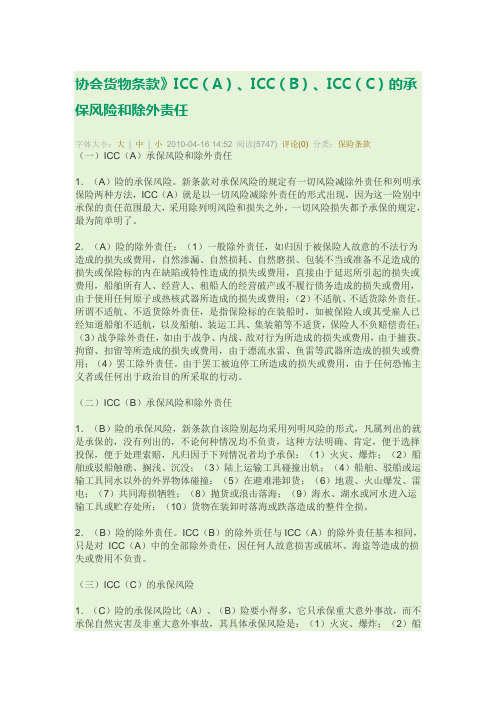
协会货物条款》ICC(A)、ICC(B)、ICC(C)的承保风险和除外责任字体大小:大| 中| 小2010-04-16 14:52 阅读(5747) 评论(0)分类:保险条款(一)ICC(A)承保风险和除外责任1.(A)险的承保风险。
新条款对承保风险的规定有一切风险减除外责任和列明承保险两种方法,ICC(A)就是以一切风险减除外责任的形式出现,因为这一险别中承保的责任范围最大,采用除列明风险和损失之外,一切风险损失都予承保的规定,最为简单明了。
2.(A)险的除外责任:(1)一般除外责任,如归因于被保险人故意的不法行为造成的损失或费用,自然渗漏、自然损耗、自然磨损、包装不当或准备不足造成的损失或保险标的内在缺陷或特性造成的损失或费用,直接由于延迟所引起的损失或费用,船舶所有人、经营人、租船人的经营破产或不履行债务造成的损失或费用,由于使用任何原子或热核武器所造成的损失或费用;(2)不适航、不适货除外责任。
所谓不适航、不适货除外责任,是指保险标的在装船时,如被保险人或其受雇人已经知道船舶不适航,以及船舶、装运工具、集装箱等不适货,保险人不负赔偿责任;(3)战争除外责任,如由于战争、内战、敌对行为所造成的损失或费用,由于捕获、拘留、扣留等所造成的损失或费用,由于漂流水雷、鱼雷等武器所造成的损失或费用;(4)罢工除外责任。
由于罢工被迫停工所造成的损失或费用,由于任何恐怖主义者或任何出于政治目的所采取的行动。
(二)ICC(B)承保风险和除外责任1.(B)险的承保风险,新条款自该险别起均采用列明风险的形式,凡属列出的就是承保的,没有列出的,不论何种情况均不负责,这种方法明确、肯定,便于选择投保,便于处理索赔,凡归因于下列情况者均予承保:(1)火灾、爆炸;(2)船舶或驳船触礁、搁浅、沉没;(3)陆上运输工具碰撞出轨;(4)船舶、驳船或运输工具同水以外的外界物体碰撞;(5)在避难港卸货;(6)地震、火山爆发、雷电;(7)共同海损牺牲;(8)抛货或浪击落海;(9)海水、湖水或河水进入运输工具或贮存处所;(10)货物在装卸时落海或跌落造成的整件全损。
1.附件1-协会货物保险A条款-中英文版
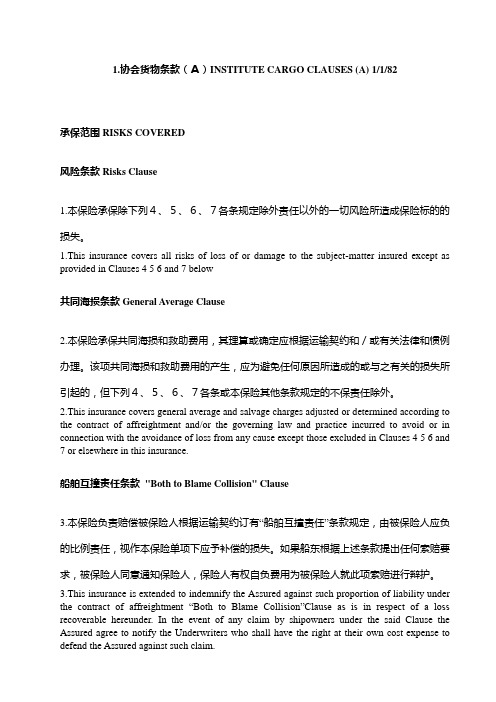
1.协会货物条款(A)INSTITUTE CARGO CLAUSES (A) 1/1/82承保范围RISKS COVERED风险条款Risks Clause1.本保险承保除下列4、5、6、7各条规定除外责任以外的一切风险所造成保险标的的损失。
1.This insurance covers all risks of loss of or damage to the subject-matter insured except as provided in Clauses 4 5 6 and 7 below共同海损条款General Average Clause2.本保险承保共同海损和救助费用,其理算或确定应根据运输契约和/或有关法律和惯例办理。
该项共同海损和救助费用的产生,应为避免任何原因所造成的或与之有关的损失所引起的,但下列4、5、6、7各条或本保险其他条款规定的不保责任除外。
2.This insurance covers general average and salvage charges adjusted or determined according to the contract of affreightment and/or the governing law and practice incurred to avoid or in connection with the avoidance of loss from any cause except those excluded in Clauses 4 5 6 and 7 or elsewhere in this insurance.船舶互撞责任条款"Both to Blame Collision" Clause3.本保险负责赔偿被保险人根据运输契约订有“船舶互撞责任”条款规定,由被保险人应负的比例责任,视作本保险单项下应予补偿的损失。
2009协会货物保险条款

2009年伦敦协会货运险条款较1982年版的变化王莹(太平保险上海分公司)上海保险 2009.7最近,在国际贸易中普遍采用的英国伦敦保险协会所制定的《协会货物运输保险条款》(即ICC保险条款)作出了值得关注的修改,联合货物保险委员会(Joint Cargo Committee)推出了2009年1月1日版本的新条款。
新条款扩展了保险责任起讫期,对保险公司引用免责条款作出了一些条件限制,对条款中容易产生争议的用词作出更为明确的规定,条款中的文字结构也更为简洁、严密。
为便于读者了解2009年1月1日版本的《协会货物运输保险条款》与1982年1月1日版本的变化,笔者下面仅以《协会货物运输保险条款(A)》(即ICC(A))为例,采用列表形式对2009年和1982年两个版本作一些比较:一、普遍性的改变1、82版除外条款下分别列有副标题,如除外条款4:普通除外条款;除外条款5:不适航或不适运除外条款;除外条款6:战争除外条款;除外条款7:罢工除外条款。
09版除外条款删除副标题,直接表示为:除外条款4,除外条款5,除外条款6,除外条款7。
因为副标题并不能完全准确地表述出副标题下所有具体列明的事项,如除外条款6若名为“战争除外条款”,但实际条款内容中列明“扣押、扣留、拘禁或羁押”,是否能理解是因战争原因导致的“扣押、扣留、拘禁或羁押”才除外呢;又如除外条款7若名为“罢工除外条款”,但实际条款内容中列明“任何恐怖主义者或者任何人出于政治目的采取的行动”也为除外,显然与所谓“罢工除外”不相一致。
为了避免歧义产生误解,09版除外条款则不再注明副标题。
2、09版将所用“雇员”一词变为“employee”,代替了82版的“servant”。
3、09版使用“保险标的”(subject matter insured),而非82版的“货物”(goods or cargo)。
4、09版使用“保险人”(insurers),不再使用82版的“承保人”(underwriters)。
英国协会货物条款ICC2009“除外责任”的新变化

英国协会货物条款(ICC2009)“除外责任”的新变化为进一步适应国际经济贸易及国际海运业务的发展变化,英国“协会货物条款”(icc)于2009 年1 月1日开始实施新版条款(以下简称icc2009)。
与1982年的条款(以下简称icc1982)相比较,新条款对保险人援引的免责条款做出了较大修改。
为使中国贸易商准确运用新版条款,笔者对icc2009的保险人“除外责任”予以分析,以期对中国贸易商有所裨益。
icc1982的“除外责任”分别列有副标题,如第4条除外责任的副标题为“一般除外责任”;第5条除外责任为“不适航和不适货除外责任”;第6条除外责任为“战争除外责任”及第7条除外责任为“罢工除外责任”。
而icc2009的“除外责任”删除了副标题,直接表示为“除外责任4,5,6和7”。
icc2009除外责任的变化不仅表现在删除了其副标题,而且其内容发生了较大变化。
其变化表现为以下几方面。
一、对保险标的包装或配装不足或不当做出了更为细致的规定icc2009第4.3条规定,保险人不承保“由于保险标的的包装或配装不足或不当引起的无法承受运输途中发生的通常事故而产生的灭失、损害或费用,此种情况适用于:该包装或配装是由被保险人或其受雇人完成的,或该包装或配装是在本保险责任开始前完成的。
( 本条所称的‘包装’,包括集装箱内的积载;本条所称的‘受雇人’,不包括独立合同人。
)”与icc1982相比较,该条的变化表现为以下几点:第一,明确了该除外责任仅适用于下列两种情况:一是保险标的的包装或配装是由被保险人或其受雇人完成的,即保险标的的灭失或损害是因被保险人或其受雇人负责完成的包装或配装不足或不当所致。
二是保险标的的包装或配装是在保险单责任开始前完成的,即货物运输开始前(如离开卖方的仓库装上卡车或火车等之前),就已存在包装或配装的不足或不当,从而导致保险标的灭失或损害。
只有在这两种情况下因包装或配装有缺陷而导致的保险标的损失,保险人才不负责赔偿。
2009年报关员测试国际货物运输保险详解一

2009年报关员测试国际货物运输保险详解一、海运货物保险在我国货物运输保险的险别,按照能否单独投保,可以分为基本险和附加险。
(一一)基本险1、根据我国现行的《海洋货物运输保险条款》的规定,在基本险别中包括平安险、水渍险和一切险二种。
※平安险(fpa)保险范围:(1)在运输途中自然灾害(如:恶劣气候、雷电、海啸、地震、洪水等)造成的整批货物的全部损失;(2)由于在运输途中意外事故(如:运输工具遭受搁浅、触礁、沉没、互撞等)造成的全部或部分损失;(3)在运输工具已经发生意外事故(搁浅、触礁、沉没、焚毁等)的情况下,货物在此前后又在海上遭受自然灾害(如恶劣气候、雷电、海啸等)所造成的部分损失;(4)在装卸或转运时,由于一件或数件整件货物跌落海中所造成全部或部分损失(5)抢救、防止或减少货损发生的合理施救费用,但以不超过该批被救货物的保险金额为限;(6)运输工具遭难后在中途港口、避难港由于装卸、存仓以及运送货物所产生的特别费用。
(7)共同海损所引起的牺牲、分摊费用和救助费用。
(8)运输契约订有“船舶互撞”条款,根据该条款规定应由货方偿还船方的损失。
※水渍险(wpa)等于平安险的责任范围加上自然灾害的部分损失。
例:水渍险的承保范围大于平安险,但对一般外来风险导致的全部损失不负赔偿责任。
答案:正确。
理由:水渍险对于运辖途中被保险货物由于一般外来风险所致的全部或部分损失不负责任,因为那是一切险的责任范围。
※一切险(all risks)责任范围:除承担水渍险的责任外,还负责被保险货物在海运途中由于一般外来风险所造成的全部或部分损失,负赔偿责任。
一切险=水渍险+ 一般外来风险(11种一般附加险) 例题(单选)1、在国际贸易中,向保险公司投保“一切险”后,在运输途中由于任何外来原因所造成的一切货损,均可向保险公司索赔。
答案:错解析:一切险是水渍险和各种附加险的总和。
其责任范围是因遭受自然灾害和外表事故以及其他外来原因引的损失,保险人都可负责赔偿。
- 1、下载文档前请自行甄别文档内容的完整性,平台不提供额外的编辑、内容补充、找答案等附加服务。
- 2、"仅部分预览"的文档,不可在线预览部分如存在完整性等问题,可反馈申请退款(可完整预览的文档不适用该条件!)。
- 3、如文档侵犯您的权益,请联系客服反馈,我们会尽快为您处理(人工客服工作时间:9:00-18:30)。
以下就主要去针对2009年1月1日所拟定的协会货物条款(A)(Institute Cargo Clauses [A] [1/1/09])的一些主要的地方作出介绍。至于为什么针对(A)条款来解释,是因为(B)条款是在实际业务中绝少被使用的,而(C)条款只被使用在运载货物的船舶发生事故,例如是沉没或者是发生碰撞等情况,才会导致的货物损失,但货物本身就不大会在运输途中损坏的情况,例如是铁矿砂。
但即使是投保了一切险,被保险人的货方还是要证明货物有损失或是损坏,这表示经常会发生的一些货物短缺,很多时候只是属于一种纸面上的损失(paper loss)。换言之,由于不少货物例如是燃油或是大宗货,都会有测量的困难与不准确。这经常会导致装港与卸港的测量结果显示货物有短缺,但实际上航次中什么事情都没发生过。在Coven SPA v Hong Kong Chinese Insurance Co (1998) EWCA Civ 1573,涉及了一船的大豆,投保的是(A)条款,但它另t but subject to an excess of 1% in the whole shipment)。结果在航次中,有一批货物的短缺是大概有14%,而双方接受这一个短缺是由于测量上的错误导致。被保险人的货方要求保险人赔偿超过了1%的短缺,所依据的就是被加上去的条款。去了上诉庭,判是货方的要求不被接受。Clarke大法官认为即使是加上了条款,它本质上还是要求货物有损失或损坏。Clarke大法官认为无法接受双方约定保险合同的时候会有任何意图去承保一些从来不存在的货物(因为纸面损失就表示根本没有该货物装上过船舶),而且货方也无法去证明他对任何货物有保险利益。上诉庭也没有说死不能对这种纸面损失决定不能去投保,但显然双方所约定的文字作为承保风险恐怕要比现在使用的文字要更加清楚才有希望能够成功。
第一条款:一切险的承保
这一条本质上在1982年条款与2009年条款根本没有作出改变,在此不作出节录,请自己查阅。主要去强调一切险是最普遍被使用的货物保险,对货方的好处是不需要去证明损失是由于什么列名的承保风险所导致,这是与船舶保险不一样。货方由于不控制这个运输,只是把货物交出给承运人或船东,所以要他们举证的话的确是十分困难或者是不可能。对保险人而言,由于货方不控制航运,所以也不存在需要担心他们会搞破坏,变了也会愿意去承保一切险,不需要他们有举证的责任,但就是不愿意接受承保船舶的一切险的主要原因。
另一个贵族院先例也显示了货物的损失或损坏必须是可能会在运输途中发生,即使是很大的可能性。反之,如果是一定会发生,就变了根本不是保险了。这一个精神也完全适用在(A)条款的一切险。该先例就是Soya G.m.b.H. v White (1983) 1 Lloyd’s Rep 122,案情是有关大豆从印尼以CIF价格运去安特卫普与鹿特丹。在第一艘船舶“Teviotbank”,船上运载的2,000吨大豆发热并造成损坏。这导致了保险人对接下去的货物运输不敢怠慢,马上去保险市场加保了一种叫“heating,sweating and spontaneous combustion”或简称HSSC险,所针对的就是货物发热、出汗与自燃的风险。由于1906年《英国海上保险法》之Section 55(2)(c)是说明除非保单另有规定,否则保险人是不承保内在缺陷或货物的本质:“Unless the policy otherwise provides, the insurer is not liable for…inherent vice or nature of the subject-matter insured.”。这表示即使是保一切险,如货物有发热、出汗与自燃的风险也是要加保HSSC险。但即使是加保了HSSC险,还是要求它带来的损失或损坏并不是一定会发生。在Soya G.m.b.H. v White,继“Teviotbank”后的两个航次,第一批是5,500吨的大豆,船舶是“Corfu Island”;第二批是3,200吨大豆,船舶是“Welsh City”。但两批货物都有损坏,原因是货物发热。第一批所带来货物的损坏是12.5%,另二批是45%,总共损失的金额高达73万美元。但保险人拒赔,其中一个最主要的理由就是这些货物由于运输的情况是一定会有这种损坏。这里就涉及了根据双方专家证据,就是他们同意如果运输时的大豆水份含量是低于某一个百分比的话,就不会发生这些发热的情况,但超出14%的话并且针对有关的航次是45天与装货时的温度是摄氏30度的话,就变了是一定会在航次中发热的情况。在第一审,Lloyd大法官接受货方的专家证人所说的,就是水份含量间于12%-14%的话,就是属于灰色地带,即在运输途中可能会发热也可能不会发热。而Lloyd大法官也根据证据(主要是根据一个在装货时的样品证明)判“Corfu Island”与 “Welsh City”在装货的时候大豆水份含量是低于13%,显示运输途中的发热并不是一定会发生,所以判保险人败诉。第一审的判决受到上诉庭与贵族院的支持。在贵族院Diplock勋爵并没有对一种情况说死就是装货时的大豆水份高到发热现象是一定会发生的时候可否获得赔付,但答案显然是明确的,Diplock勋爵是这样说的:
2009年协会货物条款(A)、(B)、(C)
Institute Cargo Clauses (A) (1/1/09) / Institute Cargo Clauses (B) (1/1/09) / Institute Cargo Clauses (C) (1/1/09)
在时间上本书的出版(第一版与第二版)也十分适合,因为除了重点介绍有关船舶保险的2003年国际船舶保险条款外,海上货物保险也有了新的条款刚刚在2009年1月1日拟定并在2月份推出。虽然相比1982年的协会货物条款改变不多,但可以去把几个主要的实质性改变在本书本章中略为介绍。
以下是挑出几条相对主要与作出了较大改变的条款作出介绍,至于1982年条款与2009年条款没有作出改变的,加上为了避免重复因为在第一版甚至是介绍2003年国际船舶保险条款的时候已经有所针对(例如像2009年条款之第16条有关施救责任),再加上因为时间的紧迫就无意去多增加内容的个别条款就不准备去进一步介绍了:
首先是一般性的解释1982年条款与2009年条款的无伤大雅的只是一些一般性更新的文字上的改变,例如是:(1)“货物”以前是用“goods”或“cargo”,而现在用“subject matter insured”;(2)“保险人”以前是用“underwriters”,而现在用“insurers”;(3)以前针对被保险人的“仆人”(servant),显然是一个过时的措辞,而现在用“雇员”(employee),这里可去看2009年条款之第5.1.2条;(4)以前的“续保”(held cover)现在改成很长的一句把它的意思充分表达出来,这在2009年条款之第10.1条,稍后会比较详细地作出介绍;(5)以前的“不允许放弃保险利益”(not to inure)不明确的英文文字也被改为更清楚的英文,这是在2009年条款之第15条款。
事实上,更重要的改变是早在1982年的协会货物条款已经有,这已经在本书第一版有所介绍。这就是从几百年来英国一直援用的劳合社S.G.保单,一下变了去使用1982年的协会货物条款(A)、(B)与(C)。这一个主要的改变可以说是海上保险的革命,主要的推动是来自联合国1975年的报告对S.G保单与海上保险作出严厉批评与其他一连串的建议,例如要以联合国的保险条款替代伦敦的保险条款等,所带来。而伦敦以前一直以来坚持要保持S.G保单的做法是为了防止新的条款会带来不稳定,会带来很多的诉讼,要去对有关新的条款作出权威性的解释,等。而S.G保单由于历史的原因,可以说它上面差不多每一个字都有先例给与了权威性的解释。不论历史是怎样,事实上在有了1982年的协会货物条款后,并被国际上大量使用,但现实上所带来的诉讼是寥寥可数,可见伦敦保险市场较早时的忧虑根本是多余。也可以印证了保险条款的改变是不需要害怕的,只要是改变了的条款是有一班高水平的人士去拟定得好、清楚明了与全面。而现在到了20年以后,有了新的条款,但这再也谈不上是革命,而只是应酬式地作出一点点地改变而已,甚至是两条款的各条款编号都是一样的。而各条款是可以分为8大类去作出不同的针对,其中第1-3条款归类为“承保风险”(risks covered);第4-7条款归类为“除外/豁免条款”(exclusions);第8-10条款归类为“承保期限”(duration);第11-14条款归类为“索赔”(claims);第15条款归类为“保险利益”(benefit of insurance);第16-17条款归类为“减少损失或施救责任”(minimising losses);第18条款归类为“避免延误”(avoidance of delay);第19条款归类为“适用法”(law and practice)。而这新的条款大家是可以在网上找到,网址是:。
